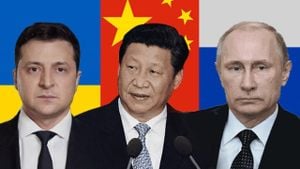Political turmoil continues to swirl around Benjamin Netanyahu's office as a scandal involving leaked classified military information evolves, raising serious concerns over national security, media relations, and the political maneuvering surrounding Israel's handling of the Gaza conflict.
At the center of this controversy is Netanyahu himself, noted for his obsession with public image and his urgent desire to cling to power—a strategy he believes shields him from longstanding corruption allegations he fervently denies. Recently, he faced substantial backlash for perceived delays in ceasing hostilities and releasing hostages held by Hamas, amid accusations of catering to his far-right coalition members at the expense of strategic diplomacy.
The alleged leak, reported to have originated from Netanyahu's office, has already resulted in five arrests and could potentially jeopardize delicate negotiations for the release of hostages taken during the recent conflict. According to court revelations, the leaked material was manipulated to present information favoring Netanyahu's hardline stance on hostage negotiations, intensifying accusations of misleading the public.
This scandal is not new; it traces back to events earlier this summer when Netanyahu added contentious demands to already established hostage and ceasefire negotiations. He insisted Israeli troops need to maintain their presence on the Gaza-Egypt border, surprising many within Israel's security establishment. These demands were dismissed by Hamas, which led to the breakdown of discussions aimed at achieving some resolution.
Heightening this web of intrigue, two significant articles—one from the British publication Jewish Chronicle and another from the German tabloid Bild—surfaced around the same time, claiming to expose secret plans from Hamas operatives. The Jewish Chronicle reported claims about Hamas leader Yahya Sinwar attempting to sneak himself and hostages out of Gaza, based on supposed finds by Israeli forces, whereas Bild asserted Hamas was deliberately dragging out negotiations as psychological warfare. Both reports found themselves under scrutiny as they seemed to align too conveniently with Netanyahu's narrative during heightened criticism.
Concerns about the impact of these articles prompted the Israeli Defense Forces (IDF) to initiate its own investigation to determine the sources of these leaks. Upon investigation, the Jewish Chronicle retracted its report, alleging it was fabricated. Meanwhile, Bild stood by its claims, stating they maintained solid grounds for publishing the material. This discrepancy sparked debates on journalistic integrity and accountability.
Over the past week, the situation escalated when Israeli authorities confirmed multiple arrests linked to unauthorized access to classified information. Eliezer Feldstein, identified as the primary suspect, is alleged to have been employed as Netanyahu's media advisor shortly after Hamas launched its attack on Israeli soil on October 7, 2023. The other detainees included four intelligence servicemen tasked with preventing such security breaches. The investigation is under strict media gag order, limiting what can be disclosed publicly.
This recent political uproar intertwines with broader debates on Netanyahu's commitment to achieving peace. Yoav Gallant, the recently ousted Defense Minister, delivered explosive remarks to families of hostages, claiming the Israeli government had achieved its military objectives but insinuated there was reluctance to enter negotiations for hostages due to Netanyahu's fear of losing his ministerial position. His firing, occurring amid unending protests against government policies, casts doubt on the unity and stability of Netanyahu’s coalition.
Gallant alleged Netanyahu impotently prolonged military action without substantial reasons, relaying concerns about risking Israeli soldiers' lives for perceived political stability. His criticism translates to broader concerns about Netanyahu's motives, with allegations surfacing asserting the Prime Minister may wish to leverage the conflict to delay upcoming elections.
Heightened tensions persisted not only within Israeli borders but also across neighboring Lebanon, where Hezbollah has vowed to continue its attacks on Israel until hostilities cease against the Palestinian population. Reports indicate significant casualties on both sides, with over 43,000 Palestinian lives lost due to sustained military actions, stirring international ire and calls for accountability.
Adding to Netanyahu's woes, calls have emerged for the establishment of a new oversight body, intended to monitor intelligence operations under his office, potentially as mitigative action against the repercussions of the leaks scandal and subsequent military fiascos.
This proposed body, defined as the Ifcha Mistabra (Devil’s Advocate) unit, aims to create additional checks and balances on intelligence functions and is amid flexible political negotiations, even as critics argue its establishment contradicts the need for transparency against the backdrop of the current investigation.
Netanyahu's administration faces more than just political scandals. The ramifications of the leaked information could complicate existing military strategies, strain foreign relations, and impact public perception—compounded by the growing impatience of families awaiting the release of their loved ones from captivity. It remains to be seen whether Netanyahu's public appeal can withstand this storm of allegations and dissent, or if it will expose chinks in the armor his political strategies have managed to maintain for years.
Consequently, the fallout from this scandal raises a plethora of questions about governance, national security, and the complex interplay of media and politics within Israel's volatile climate. The investigations continue, potentially reshaping the political terrain as stakeholders press for accountability and transparency. With the storm looming large, Netanyahu's next moves will likely dictate the future of not only his political career but the broader Israeli public's trust in its leaders.



